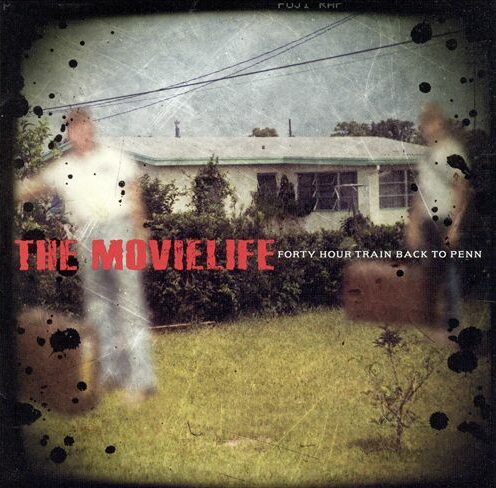
Like many people who grew up in the height of the Drive-Thru Records era, discovering new up and coming bands was a bit of a tricky science. For me personally, I found many new artists through punk rock CD compilations, surfing the web on AbsolutePunk, getting to a concert early to check out the openers, or by skimming through the pages of Alternative Press. So how did a band like The Movielife make it so easy to enjoy their music? The Movielife were a punk rock band in spirit, but their ability to mix in hardcore elements and make their concerts an experience made me a lifelong fan. Early songs like “Hand Grenade” and “Walking On Glass” were my first introduction to the band, and it made me backtrack through their earlier catalog to grab as much music as I could get my hands on.
The third full-length studio album from The Movielife felt like a momentous opportunity for them to stand out from the pack of Drive-Thru bands that began dominating the greater part of the decade. Forty Hour Train Back To Penn was recorded at Salad Days Studio with veteran producer Brian McTernan, and his fingerprints are all over this punk classic. The band released two singles from the set, “Jamestown” and “Face or Kneecaps,” however during the promotional cycle of the record, The Movielife decided to call it quits. This kind of derailed the intentions of Drive-Thru Records doing a bigger push for the LP, but the legacy that this band left behind is still felt today. The majority of the songs written on this record were by lead vocalist Vinnie Caruana and guitarist Brandon Reilly, and they would end up being the last ones standing when The Movielife released Cities in Search of a Heart 14 years later. Forty Hour Train Back To Penn tackles many situations head-on like fractured relationships, traveling on the road, and growing up, while still having an emotional element to each track to showcase the band’s collective growth as people and musicians.
The LP opens with the steady guitar bounce of “Face or Kneecaps,” that features a memorable chorus of, “Under the circumstance, you act like a kid and you walked away / What was the last thing that you said? / Shying away, ’cause you wanted it every day / And you lost it all, and you lost it all.” Caruana remained as captivating as he’s ever been as a frontman and storyteller through the band’s music, and he made you feel welcomed by listening to each of his lyrics. “Jamestown” follows the fun opener with a frantic guitar riff in the opening verse with some shouted vocals from Caruana, all to get the crowd involved with the vocal callback parts in the verses. What the band does well on songs like this is to make a point a change tempos every now and then in the bridge to bring more purpose to each pointed lyric. The closing line in the bridge of “If my mind’s the weapon / My heart’s the extra clip” might be the most emo lyric to come out of the Drive-Thru era, and that’s saying something.
”Spanaway” is a mid-tempo rocker that unfortunately never quite takes off in the chorus, and it ends up sounding a bit like a B-side with its seemingly out of place piano interlude towards the middle of the track. It’s a curious choice of sequencing songs by breaking up the great one-two punch of the openers with this type of sound. Luckily, “Kelly” brings the storytelling back to the forefront of the band’s strengths, all paired with a memorable sing-a-long chorus. The second verse of, “A second chance means nothing / If nothing’s learned from past mistakes / And I’m sure we felt the weight, the weight,” carries some good advice for the listener and showcased The Movielife’s songwriting improvements.
”Takin’ It Out and Choppin’ It Up” sounds exactly like you would expect a song title like this from The Movielife to sound like: a choppy, riff-laden, punk rock song. It’s only flaw is sounding a bit too formulaic from the ground covered earlier, but it’s a lot of fun to mosh around with live. “Scary” remains the middle of the record standout with its rolling drumming open, paired with some melodic guitars to provide the perfect landscape for Caruana to sing over. Had the band not broken up during the promotional cycle of the album, this would have been an obvious choice of a third single.
”Hey” is a great, near-acoustic ballad about friendships that still remains a staple of Vinnie Caruana’s solo sets. The full-band version of this slow-jam found on Forty Hour Train Back To Penn is just as meaningful as the solo acoustic version, and it doesn’t seem out of place on an energetic album.
”Jamaica Next” picks the pace up to their comfortable tempo, while the next track of “It’s Something” accomplishes what “Spanaway” should have become. Switching the order of these two songs would’ve made more sense in the sequencing, but considering how long it would be until we got new music from the band, you’ll take what you can get. “Keep Never Changing” ends up sounding a bit too much like the early Movielife songs, just slightly updated, but the closer of “Ship To Shore” does its best to prevent this boat from steering too far off course, and it corrects some of the early missteps that occurred on this album.
There’s a lot to unpack and love about this album by The Movielife. Had we had the foresight of knowing this would be the last effort from the band for 14 years, we may have cherished this moment in time a little bit more. But alas, we still have the music to look back on, and remember when Drive-Thru Records had some of the best punk and pop-punk artists to ever grace our scene.
 Jamestown
Jamestown